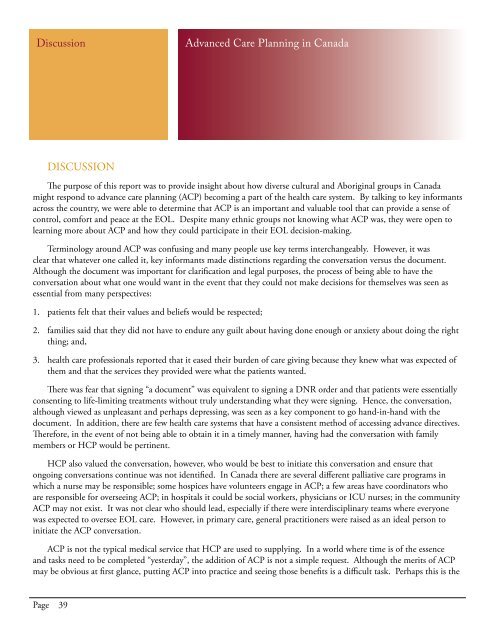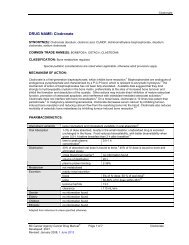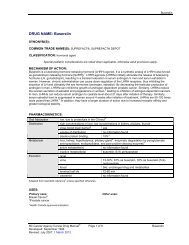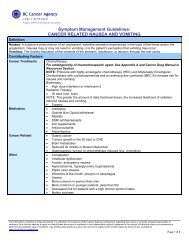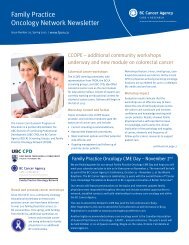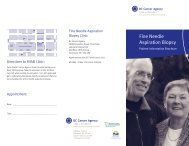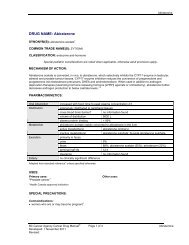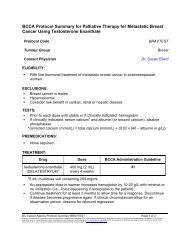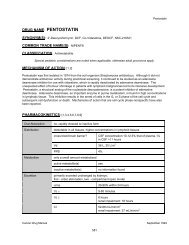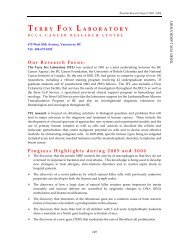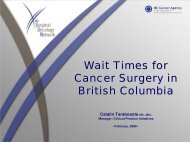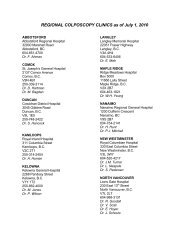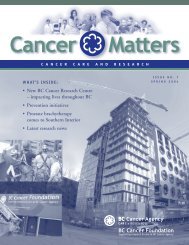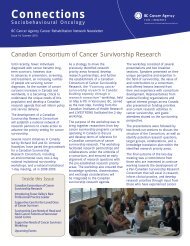Cross-Cultural Considerations in Promoting Advance Care Planning ...
Cross-Cultural Considerations in Promoting Advance Care Planning ...
Cross-Cultural Considerations in Promoting Advance Care Planning ...
You also want an ePaper? Increase the reach of your titles
YUMPU automatically turns print PDFs into web optimized ePapers that Google loves.
Discussion<br />
<strong>Advance</strong>d <strong>Care</strong> Plann<strong>in</strong>g <strong>in</strong> Canada<br />
DISCUSSION<br />
The purpose of this report was to provide <strong>in</strong>sight about how diverse cultural and Aborig<strong>in</strong>al groups <strong>in</strong> Canada<br />
might respond to advance care plann<strong>in</strong>g (ACP) becom<strong>in</strong>g a part of the health care system. By talk<strong>in</strong>g to key <strong>in</strong>formants<br />
across the country, we were able to determ<strong>in</strong>e that ACP is an important and valuable tool that can provide a sense of<br />
control, comfort and peace at the EOL. Despite many ethnic groups not know<strong>in</strong>g what ACP was, they were open to<br />
learn<strong>in</strong>g more about ACP and how they could participate <strong>in</strong> their EOL decision-mak<strong>in</strong>g.<br />
Term<strong>in</strong>ology around ACP was confus<strong>in</strong>g and many people use key terms <strong>in</strong>terchangeably. However, it was<br />
clear that whatever one called it, key <strong>in</strong>formants made dist<strong>in</strong>ctions regard<strong>in</strong>g the conversation versus the document.<br />
Although the document was important for clarification and legal purposes, the process of be<strong>in</strong>g able to have the<br />
conversation about what one would want <strong>in</strong> the event that they could not make decisions for themselves was seen as<br />
essential from many perspectives:<br />
1.<br />
2.<br />
3.<br />
patients felt that their values and beliefs would be respected;<br />
families said that they did not have to endure any guilt about hav<strong>in</strong>g done enough or anxiety about do<strong>in</strong>g the right<br />
th<strong>in</strong>g; and,<br />
health care professionals reported that it eased their burden of care giv<strong>in</strong>g because they knew what was expected of<br />
them and that the services they provided were what the patients wanted.<br />
There was fear that sign<strong>in</strong>g “a document” was equivalent to sign<strong>in</strong>g a DNR order and that patients were essentially<br />
consent<strong>in</strong>g to life-limit<strong>in</strong>g treatments without truly understand<strong>in</strong>g what they were sign<strong>in</strong>g. Hence, the conversation,<br />
although viewed as unpleasant and perhaps depress<strong>in</strong>g, was seen as a key component to go hand-<strong>in</strong>-hand with the<br />
document. In addition, there are few health care systems that have a consistent method of access<strong>in</strong>g advance directives.<br />
Therefore, <strong>in</strong> the event of not be<strong>in</strong>g able to obta<strong>in</strong> it <strong>in</strong> a timely manner, hav<strong>in</strong>g had the conversation with family<br />
members or HCP would be pert<strong>in</strong>ent.<br />
HCP also valued the conversation, however, who would be best to <strong>in</strong>itiate this conversation and ensure that<br />
ongo<strong>in</strong>g conversations cont<strong>in</strong>ue was not identified. In Canada there are several different palliative care programs <strong>in</strong><br />
which a nurse may be responsible; some hospices have volunteers engage <strong>in</strong> ACP; a few areas have coord<strong>in</strong>ators who<br />
are responsible for oversee<strong>in</strong>g ACP; <strong>in</strong> hospitals it could be social workers, physicians or ICU nurses; <strong>in</strong> the community<br />
ACP may not exist. It was not clear who should lead, especially if there were <strong>in</strong>terdiscipl<strong>in</strong>ary teams where everyone<br />
was expected to oversee EOL care. However, <strong>in</strong> primary care, general practitioners were raised as an ideal person to<br />
<strong>in</strong>itiate the ACP conversation.<br />
ACP is not the typical medical service that HCP are used to supply<strong>in</strong>g. In a world where time is of the essence<br />
and tasks need to be completed “yesterday”, the addition of ACP is not a simple request. Although the merits of ACP<br />
may be obvious at first glance, putt<strong>in</strong>g ACP <strong>in</strong>to practice and see<strong>in</strong>g those benefits is a difficult task. Perhaps this is the<br />
Page 39


